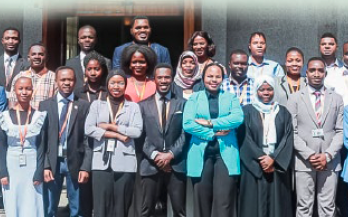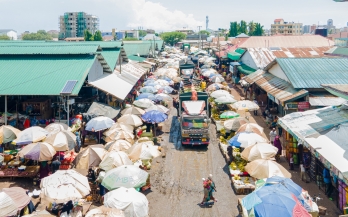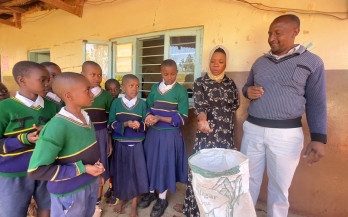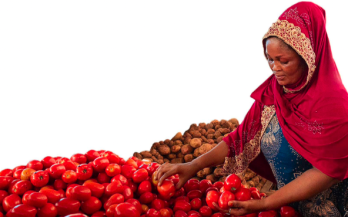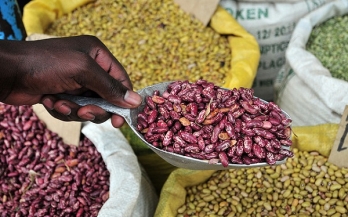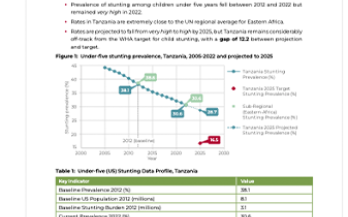- 11/10/2025
Youth in Tanzania are active at the community level but remain largely absent from formal
governance. There is potential for Tanzanian youth to more actively help Tanzania in its ambition to
achieve a nutrition-sensitive, climate resilient, inclusive food system.
As we prepare for the 2025 Global Forum (13 – 17 October) marking ten years of the Milan Urban Food Policy Pact, we're bringing insights from our work across Africa and Asia on how city governments and local food markets can transform urban food environments and wider food systems.
Walking through any bustling urban food market, from Pemba (Mozambique) to Arusha (Tanzania) and Bogor (Indonesia), is a remarkable experience. Beyond the offerings of fresh, dried, iced and frozen produce, spices, cooked traditional meals, and animated negotiations between vendors and customers, the experience of the market is at the nexus of food systems and nutrition policies and daily realities. These markets are about more than selling and buying food; they are where the future of food systems, within cities and across urban–rural landscapes, borders, and territories, is being lived, innovated, and imagined.
GAIN Tanzania is at the forefront of efforts to tackle micronutrient deficiencies through biofortification, an approach that enhances the nutritional content of staple crops. One of its most impactful initiatives has focused on high iron beans (HIB), a locally accepted, nutrient-rich variety introduced through partnerships with schools and farming communities. By connecting farmers to institutional markets and supporting local seed systems, GAIN is creating a sustainable, scalable model for improving diets and livelihoods. In this interview, Prisca Kokutona Rwezahura, Country Director -GAIN Tanzania, reflects on this journey- sharing insights into policy, partnerships, and what’s next for biofortification in the country.
In April 2025, we took part in the Act4Food Youth Leaders Workshop held in Arusha, Tanzania, a truly transformative experience that deepened our already strong convictions of the power and potential of young people to shape the future of our food systems. Organized by ACT4FOOD with support from the Global Alliance for Improved Nutrition (GAIN), the workshop brought together 22 youth leaders from across the globe working under the ACT4FOOD banner, along with GAIN staff and additional food systems youth leaders from Tanzania.
- 03/06/2025
The food safety regulatory framework in Tanzania is characterized by the absence of a comprehensive, overarching policy framework dedicated solely to food safety. Instead, food safety governance is fragmented across various laws and regulations managed by different institutions each addressing specific aspects of food safety.
In Tanzania, 85- 90% of the land is cultivated by smallholder farmers majority of whom face challenges in getting access to quality seeds and assured markets for their produce, thus limiting their capabilities to produce quality produce and generate steady income. Currently, 57% of pregnant women in Tanzania are anemic. Additionally, according to the Tanzania Demographic and Health Survey 2015 (TDHS), 58% of children under the age of 5 years in the country were anemic.
- 16/05/2025
WHA Global Nutrition Stunting Target 2012-2025
Achieve a 40% reduction in the number of children under-5 who are stunted
WHA Global Nutrition Overweight Target 2012-2025
Ensure that there is no increase in childhood overweight
This video showcases GAIN’s collaboration with Buguruni Market (Dar es Salaam, Tanzania). It illustrates the early testing of the Food Systems Governance model; highlighting the importance of i) knowing the local food system, ii) One Nutrition (nutrition, food hygiene and safety, reduced food waste), and iii) engaging multiple stakeholders to co-design and support infrastructure investments that enhance vendor livelihoods, as well as improve the quality, safety, and value of food stored, upcycled, and sold to consumers.
- 23/05/2024
Buguruni market is a traditional food market in Dar-es-Salaam, Tanzania with about 2,630 vendors selling their produce to about 70,000 consumers daily. In a rapid assessment conducted in 2020, almost a third of consumers reported concerns related to food safety when shopping in the market.
